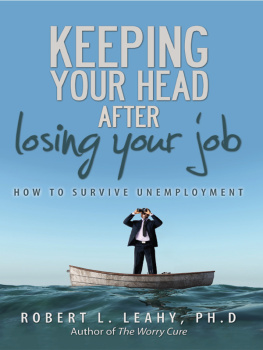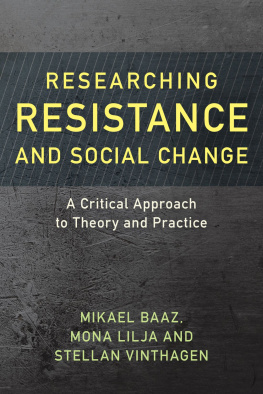
Overcoming Resistance in Cognitive Therapy
ROBERT L. LEAHY

THE GUILFORD PRESS
New York London
2012 Epub ISBN: 9781462506057; Kindle ISBN: 9781462506064
2001 Robert L. Leahy
Published by The Guilford Press
A Division of Guilford Publications, Inc.
72 Spring Street, New York, NY 10012
www.guilford.com
Paperback edition 2003
All rights reserved
No part of this book may be reproduced, translated, stored in a retrieval system, or transmitted, in any form or by any means, electronic, mechanical, photocopying, microfilming, recording, or otherwise, without written permission from the Publisher.
Last digit is print number: 9 8 7 6 5 4 3 2
Library of Congress Cataloging-in-Publication Data
Leahy, Robert L.
Overcoming resistance in cognitive therapy / Robert L. Leahy.
p. cm.
Includes bibliographical references and index.
ISBN 1-57230-684-X (hardcover) ISBN 1-57230-936-9 (paper)
1. Cognitive therapy. 2. Resistance (Psychoanalysis) I. Title.
RC489.C63 L384 2001
616.89142dc21
2001033291
To those patients who have
taught me about their struggles
Open your eyes.
Why open my eyes when the form
of Krishna resides within?
RUSKHAN, 16th century
Robert L. Leahy, PhD, is President-Elect of the International Association of Cognitive Psychotherapy and Editor of the Journal of Cognitive Psychotherapy: An International Quarterly. The author or editor of nine books, including Treatment Plans and Interventions for Depression and Anxiety Disorders (with Stephen J. Holland) and Bipolar Disorder: A Cognitive Therapy Approach (with Cory Newman, Aaron T. Beck, Noreen Reilly-Harrington, and Laszylo Gyulai), Dr. Leahy is also the Founder and Director of the American Institute for Cognitive Therapy in New York (www.CognitiveTherapyNYC.com) and Clinical Associate Professor in the Department of Psychiatry at WeillCornell Medical College.
I would like to begin by thanking Seymour Weingarten of The Guilford Press, who had the patience to recognize that a book on resistance was bound to come in past the deadline. Jim Nageotte of Guilford was very helpful in providing me with editorial feedback to tighten the manuscript. Tony Papa and Lisa Wu of Columbia University tirelessly reviewed the manuscript and assisted with its production.
My ideas about an integrative cognitive model of resistance have benefited over several years from discussions with members of the American Institute for Cognitive Therapy in New York. I would like to thank Mudita Buhadur, Christiane Humke, Lynn Marcinko, Laura Oliff, and Elizabeth Winkelman. My friend and colleague Stephen Holland has been an invaluable source of knowledge and support over the years and has given me many insights into the understanding of personality and resistance. David Clark made numerous helpful comments on the manuscript. Needless to say, any errors and oversights are mine.
Of course, I wish to thank my wife, Helen, who often had the ironic humor to comment on my resistance to completing a book on resistance. And my gratitude is especially extended to the many patients whom I have seen who have taught me about the reasons and the logic of resistance, and have helped me understand that it is much easier to change what you say than to change how you feel.
Contents
1
He who saves a single life saves the world entire.
TALMUD, SANHEDRIN
D espite the efforts of therapists and patients, many patients in cognitive-behavioral therapyor any therapydo not improve. For example, perhaps one out of three patients treated for depression in cognitive therapy shows clinically significant change. Moreover, some studies indicate that about 40% of patients terminate prematurely. These results pertain to cognitive therapy, a modality often praised as a treatment with proven efficacy. Why do so many patients drop out? Of those remaining, why do one-third not improve? What could account for these less-than-spectacular results?
A common view of cognitive-behavioral therapy is that it relies on structured treatment packages and specific intervention techniques, often applied in what appears to some as a manner that does not take into account the individuality of the patient. Unlike psychodynamic therapists, who emphasize the patients earlier developmental history and current transference as impediments to current change, the cognitive therapist is often viewed as driven by naive optimism while ignoring the fundamental resistance that the patient displays.
As cognitive therapy has matured as a therapeutic model, there has been an increased awareness of the need to adapt the model to overcome impediments to individual change. In the last decade there has been considerable interest among cognitive therapists in individualizing treatment by utilizing case conceptualization (Beck, Freeman, & Associates, 1990; J. Beck, 1996; Leahy, 1991; 1996a, 1999a; Needleman, 1999; Persons, 1989; Tompkins, 1999). Case conceptualization includes an analysis of the patients current cognitive schemas, interpersonal problems and behavioral deficits, and excesses as related to early childhood experiences. But case conceptualization may take a form different from these standard guidelinesa point that will be illustrated in my discussions of varieties of resistance. Throughout this book, I rely on case conceptualizations as a guide in dealing with resistance and countertransference.
DIMENSIONS OF RESISTANCE
My purpose is to outline several causes or dimensions of resistance to change and to indicate how these may be addressed within a cognitive therapy model. Before individual change can occur, the therapist must first learn what the patients view of this change is and what the patient sees he is giving up in abandoning his current position. For example, consider the woman who has been married for 15 years to an abusive, withholding, passiveaggressive, alcoholic husband who refuses to have sex with her. She is having problems in her career. From the therapists point of view, almost anything that gets the patient out of the marriage would be a positive change. The therapist is bewildered that the patient stays in the relationship, even after her practical problemssuch as where to live and how to support herselfare resolved. Why does she resist change? The naive therapist might assume that the patient does not want to change or suffers from psychological masochism. But the patient feels trapped and complains of her suffering. How does the patient see change?
Contrary to the beliefs of the naive therapist, who views personal change only from the perspective of solving practical problems, the therapist who addresses the patients resistance learns that change is often about solving psychological problems, not just solving practical problems. Solving practical problems may help address psychological problems, but it is seldom enough in the case of patients presenting with longer term personality problems.
Several dimensions must be addressed to help the resistant patient. First, she may need validation for her feelings and for her perspective. If the therapist says, in a cavalier manner, Just move out and get divorced, he may be viewed by the patient as unable to understand how badly she feels and how difficult she sees her future to be. Validating her suffering and her sense of hopelessness may be a necessary component of helping her to change. His recommendations may be viewed as condescending and may add to the patients sense of hopelessness. The patient may think, How can he help me if he doesnt understand me?
Next page















